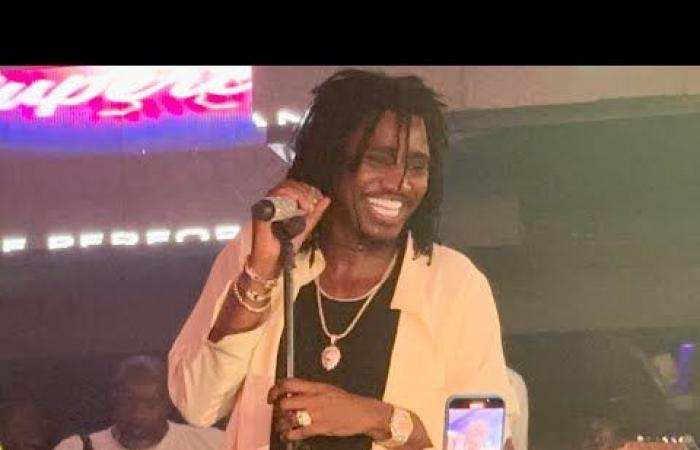Son of the illustrious Thione Ballago, Wally Seck was able to impose his own style and become an essential figure on the Senegalese Music scene. Between his father’s heritage and daring innovations, he captures the attention of a youth eager for festive rhythms, while flying high the colors of Senegalese music internationally.
As the saying goes, “hell can’t lie”. However, there is a difference between the father’s style and that of the son. Wally Seck, we recognize, sings well with an original style, but very different from that of his late father, Thione Ballago Seck. The latter was an excellent lyricist and a good love singer. Wally, for his part, has a plural style, both musically and sartorially. Driven by hard work and a clear artistic vision, the forty-year-old was able to free himself from his father’s shadow to become an essential figure in Senegalese music and continues to impress music lovers.
Abandoning his dream of becoming a football player, his father found him a place in his group “Raam Daan”. Upon his return to his native country, Wally began, from his early childhood, to hum and mime his father’s songs. The return of the child prodigy left its mark and seduced many with the release of his first single, “Bo-Dioudo”, at the end of 2007, a trigger for his career, followed by his first album, “Voglio ”, which means “to want” in Italian. An album released on December 17, 2010, composed of seven tracks, and which allowed him to impose his mark. “El phenomeno” has adapted to the sound realities of the moment, which rely more or less on the digital dimension of machines. “Thione Seck, it was the charisma and the power of the texts, an excellent lyricist, and Wally Seck, it was more the power of the rhythms and his ability to polarize his audience on his person”, compares Guissé Pène, consultant and trainer in the legal environment of music.
A stage and style icon
According to Alioune Diop, journalist and music critic at Radio Senegal International (Rsi), Wally Ballago’s music has a more or less higher speed than that of his father, who was very inspired by oriental sounds, both in the field of music as well as in the field of singing. For him, Wally’s music is different from his father’s in terms of rhythm. Wally, he says, knows how to make the instruments really vibrate, even if the backbone of his orchestra is still made up of his dad’s musicians. “Wally’s percussion is much more groove-y than his dad’s. That is to say, his percussions are much heavier,” says the journalist. Then, he adds, even if the rhythmic aspect is quite groove, the other instruments offer more or less transversal sound orientations. Sometimes it’s sharp, sometimes it’s heavy. Sometimes also, the sound orientations take on a downright medium character, that is to say, between the two tendencies, high and heavy.
Despite this difference in style, the young “Faramareen” benefits from a paternal heritage. “Son of a singer who has had an exceptional career in Senegalese music, Wally took this opportunity to establish himself well on the musical scene and have a good start,” explains analyst Guissé Pène. Aware of this advantage, the artist has repositioned his success towards young people, those who knew very little about the patriarch, and his music is gaining more ground. Music which, at the beginning, was intended for children, but gradually expanded to young people. Today, even older people have started to listen attentively to his works. “His music has evolved a lot. It is consumed in offices, in homes and even in road traffic. And then, with other nationalities in his orchestra, I think it played a pretty important role.
I want to talk about his guitarist, who comes to us from Mali. So, it’s quite important, this mixture,” underlines Alioune Diop. For him, Wally knew how to adapt to the musical styles that existed before his arrival. He listened attentively to what was happening on the Senegalese scene before making a synthesis, and this affected almost all levels of society. “He is following in his father’s footsteps and has a lot of merit. And then, in terms of text, he addresses themes often linked to love, but also others which refer to his socio-ethnic belonging,” adds the music critic.
The darling of the younger generation
With an original style of singing, a beautiful, suave and above all languorous voice, if we add his physique as a wealthy forty-year-old and his ability to bring atmosphere to his music, we understand perfectly why many young girls and boys are hustling at his concerts: an artist who responds well to the needs of young people. With more than 54% young people in Senegal, Wally Seck has managed to capture the attention of this generation hungry for rhythms and festive moments. “He understood that this youth is in love with atmosphere and music. He gives them this pleasure while imposing his style,” explains Guissé Pène.
At the start of his career, his name naturally referred to his illustrious father, considered one of the greatest lyricists in Senegal. However, Wally was able to establish himself with his own style. “Today he managed to give himself a name. When we say Wally, everyone knows who it is,” the music expert always emphasizes.
He owes this artistic emancipation to an exceptional work force and a vision resolutely focused on innovation. He does not hesitate to explore new registers, collaborating with international artists and experimenting with different styles, beyond traditional Mbalax.
Strategic collaborations
The darling of Senegalese music does not just follow the expectations of his audience; he shapes them. Thanks to his catchy rhythms and his ability to polarize attention, Wally has become a true voice for Senegalese youth, on stage and internationally.
Another notable fact is that in recent years he has multiplied duets, whether with local artists like Mia Guissé and Amadeus, or international stars. Collaborations that enrich its repertoire and strengthen its professionalism. “Each duet is a shared experience that enhances it artistically. These partnerships also allow it to explore new musical horizons, such as acoustic formats or world music. Today, if we don’t share, we don’t win,” analyzes Guissé Pène, emphasizing the importance of these exchanges for an artist’s career.
Aliou Diop agrees: “Today, doing duets is of capital importance in an artist’s career and Wally took advantage of this opportunity. It allows you to get out of your orchestra’s repertoire and avoid monotony.” So, even in terms of marketing, these duets attract the attention of another audience, sometimes with men, sometimes with women, and allow you to maintain a certain balance in terms of career. “Sometimes they are artists younger than him, and that is an asset, because the younger ones always come with new touches,” notes the journalist.
But if Wally Seck is often compared to Michael Jackson for his daring clothing style on stage, Guissé Pène reminds us that this extravagance is a well-thought-out strategy. “The artist is the spectacle. On stage, Wally attracts attention with carefully chosen stage outfits, but off stage he remains simple and modest. » This effort at staging contrasts with the sometimes casual attitude of other groups in Senegal. For Guissé Pène, uniformity in the stage presentation could reinforce the beauty of the shows and contribute to the professionalism of Senegalese artists.
Today, Wally Seck is one of the most prominent ambassadors of Senegalese music. All over the world, he proudly represents his country and breathes new life into “Mbalax”. His ability to address an entire generation and his collaboration with talents from diverse backgrounds have made him a contemporary icon and a major player in Senegal’s cultural influence.
By Adama NDIAYE






